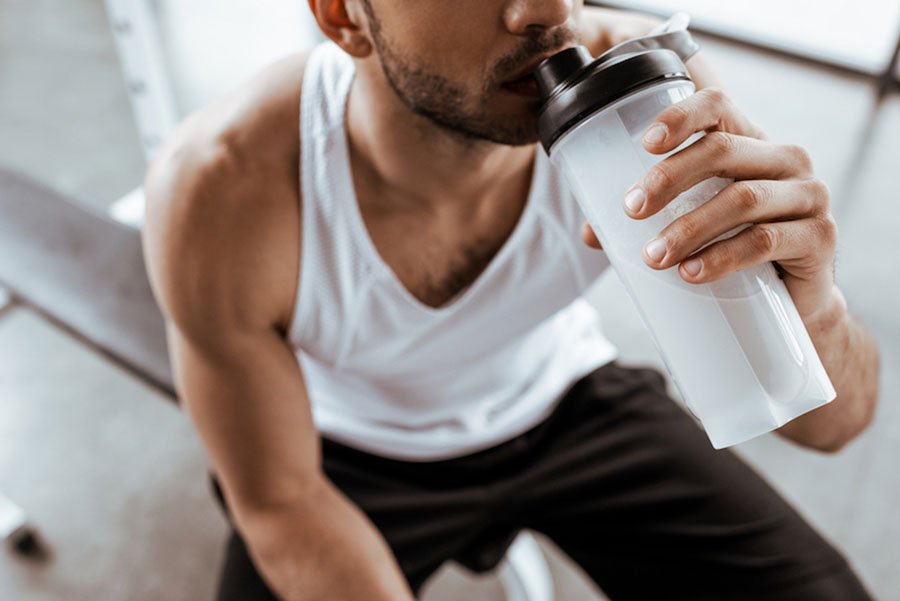Creatine is a popular and widely-used supplement in the fitness industry. It is known for its ability to increase muscle mass, performance, and recovery. Many people can benefit from supplementing with creatine, not just professional athletes. Not only does creatine increase exercise performance and recovery, it is also linked to several other health benefits, like improved brain function.
The use of creatine supplements is known to have numerous benefits, but it’s essential to consider any potential side effects. Although creatine is generally considered safe for most individuals, there are claims suggesting that it may contribute to hair loss, which highlights the importance of hair care. To make an informed decision, it’s necessary to examine the evidence regarding this claim closely.
Table of Contents
Is There a Link Between Creatine and DHT (dihydrotestosterone)?
Dihydrotestosterone (DHT) is an androgenic hormone that is responsible for the development of male characteristics. DHT is created when certain enzymes convert testosterone in men’s testes and prostate and women’s ovaries.
DHT interferes with the hair growth cycle, shrinking and shortening the hair, increasing hair loss and preventing hair growth. Because creatine is thought to increase the rate of the conversion of testosterone to DHT, people believe that creatine causes hair loss.
There is only one study that has shown a link between creatine supplementation, DHT, and hair loss. The study examined testosterone and DHT concentrations after supplementing with creatine. After 7 days of creatine loading, or a further 14 days of creatine maintenance dose, serum T levels remained unchanged. However, DHT levels increased by 56% after 7 days of creatine loading and remained 40% above baseline after 14 days maintenance.
The results of this study have never been repeated, and therefore are not conclusive. Although there is significant evidence supporting the performance benefits of creatine supplementation, the mechanisms of action in creatine are not entirely understood, especially when it comes to effects on dihydrotestosterone (DHT). Further research is needed to understand the relationship between creatine supplementation, DHT, and hair loss.
For now, it’s safe to say that there is a pretty good chance that creatine probably doesn’t cause hair loss.

Risk of Hair Loss vs Reward: Should I Take Creatine?
Research suggests that creatine supplementation can provide many health benefits, including improved exercise performance, increased muscle mass, and better brain health.
Benefits of Creatine
Muscle growth
Creatine stimulates muscle growth for many individuals in both the short- and long-term, not just athletes. Evidence suggests that older adults who regularly did muscle-strengthening activities and supplemented with creatine improved leg strength and muscle mass, thus improving quality of life.
Weightlifters who used creatine improved muscle fiber growth, doubled their lean body mass, and increased their one-rep maximum on bench press, one of the main lifts used to determine strength in powerlifting.
Increased strength and performance
In addition to increasing muscle growth, creatine can also improve exercise performance, boosting strength, power, and endurance during high-intensity exercise.
Creatine helps muscles quickly regenerate energy in the form of ATP during high-intensity exercise or heavy lifting.
Taking a creatine supplement increases stores of phosphocreatine. This is a form of stored energy in the cells. It allows the body to quickly produce more energy in the form of a molecule called ATP.
Prevent injury and reduce recovery time
There is mounting evidence that suggests creatine not only improves exercise performance, but also plays a role in preventing or reducing injury, improving rehabilitation from injuries, and helping athletes to tolerate more intensive training programs.
Brain Health
Phosphocreatine is stored in the brain in addition to muscles. The brain requires an ample supply of ATP for optimal functioning.
Research shows that creatine supplementation may improve brain health and prevent neurodegenerative diseases like Alzheimer’s, Parkinson’s, and Huntington’s disease.
Supplementing with creatine may also improve short-term memory and overall intelligence.

What Supplements Can Cause Hair Loss?
There are some other supplements besides creatine that could cause hair loss. Both vitamin deficiencies and overconsumption of vitamins and minerals can lead to unwanted symptoms including hair loss.
Vitamins
According to the American Academy of Dermatology, taking too much of specific vitamins and minerals (e.g. selenium, Vitamin A, and Vitamin E) can actually cause hair loss instead of preventing it. It’s important to find out whether you actually need to supplement with certain vitamins or minerals, which can be determined by a simple blood test.
Iron
Iron deficiencies can cause anemia, which is associated with muscle weakness and fatigue, shortness of breath, and hair loss. If you are iron deficient, supplementing with iron may help improve hair quality and reverse hair loss.
Anabolic Steroids
Anabolic steroids are technically prescription medications that are illegal to use in the United States without a prescription from a doctor. However, many people do use them without a prescription. Anabolic steroids can cause many side effects including acne, infertility, and hair loss.

Bottom Line: Creatine and Hair Loss
Creatine is a widely used supplement in the fitness industry. It is one of the safest and most researched supplements on the market. Although one study showed a potential link between creatine supplementation and hair loss, the results of the study have never been repeated. Most experts agree that creatine is unlikely to cause hair loss.
Years of research have linked significant health benefits to supplementing with creatine, and very few risks are associated with the performance-boosting substance. Ultimately, it’s up to you to decide whether or not creatine supplementation is right for you.










